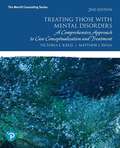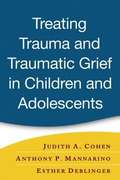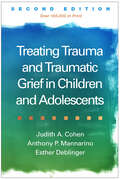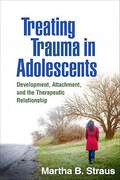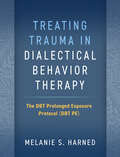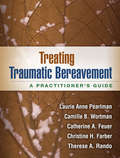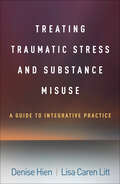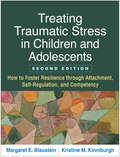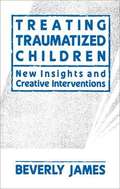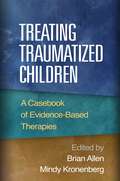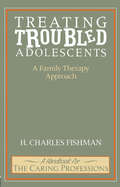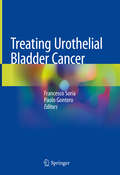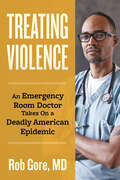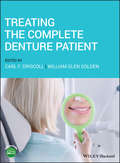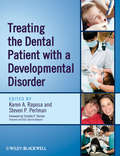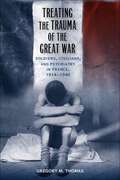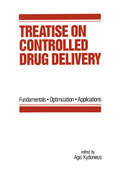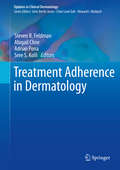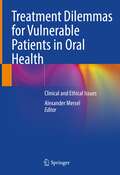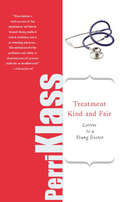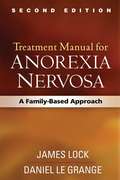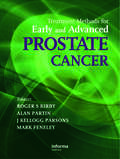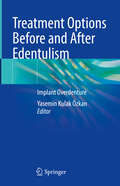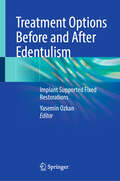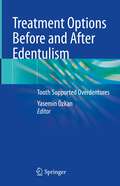- Table View
- List View
Treating Those with Mental Disorders: A Comprehensive Approach to Case Conceptualization and Treatment
by Victoria E. Kress Matthew J. PayloThis book offers students and new counselors specific treatment planning, implementation, and intervention strategies in addition to background information on clinical issues and DSM-5 diagnoses and interventions. A strength-based framework for conceptualizing and treating clients guides students through the process of selecting and implementing treatments. Real-life examples illustrate how critical counseling concepts and approaches are applied in actual practice. Updated with current, evidence-based treatment techniques, a new chapter on culture and ethics, and even more applications and examples, this highly practical resource empowers counselors to thoughtfully and deliberately help their clients tackle complex issues and difficulties.
Treating Trauma and Traumatic Grief in Children and Adolescents
by Judith Cohen Anthony MannarinoThis is one of the first books to present a systematic treatment approach, grounded in cognitive-behavioral therapy, for traumatized children and their families. Provided is a comprehensive framework for assessing posttraumatic stress disorder, depression, anxiety, and other symptoms; developing a flexible, individualized treatment plan; and working collaboratively with children and parents to build core skills in such areas as affect regulation and safety. Specific guidance is offered for responding to different types of traumatic events, with an entire section devoted to grief-focused components. Also addressed are ways to tailor treatment to children's varying developmental levels and cultural backgrounds. The authors' approach has been nationally recognized as an exemplary evidence-based program.
Treating Trauma and Traumatic Grief in Children and Adolescents, Second Edition
by Anthony P. Mannarino Esther Deblinger Judith A. CohenThis authoritative guide has introduced many tens of thousands of clinicians to Trauma-Focused Cognitive-Behavioral Therapy (TF-CBT), a leading evidence-based treatment for traumatized children and their parents or caregivers. Preeminent clinical researchers provide a comprehensive framework for assessing posttraumatic stress disorder (PTSD), other trauma-related symptoms, and traumatic grief in 3- to 18-year-olds; building core coping skills; and directly addressing and making meaning of children's trauma experiences. Implementation is facilitated by sample scripts, case examples, troubleshooting tips, and reproducible client handouts. Purchasers get access to a Web page where they can download and print the reproducible materials in a convenient 8 1/2" x 11" size. TF-CBT is listed in SAMHSA's National Registry of Evidence-Based Programs and Practices. New to This Edition *Incorporates a decade's worth of advances in TF-CBT research and clinical practice. *Updated for DSM-5. *Chapter on the model's growing evidence base. *Chapter on group applications. *Expanded coverage of complex trauma, including ways to adapt TF-CBT for children with severe behavioral or affective dysregulation. See also the edited volume Trauma-Focused CBT for Children and Adolescents: Treatment Applications for more information on tailoring TF-CBT to children's varying developmental levels and cultural backgrounds.
Treating Trauma in Adolescents: Development, Attachment, and the Therapeutic Relationship
by Martha B. StrausThis book presents an innovative and empathic approach to working with traumatized teens. It offers strategies for getting through to high-risk adolescents and for building a strong attachment relationship that can help get development back on track. Martha B. Straus draws on extensive clinical experience as well as cutting-edge research on attachment, developmental trauma, and interpersonal neurobiology. Vivid case material shows how to engage challenging or reluctant clients, implement interventions that foster self-regulation and an integrated sense of identity, and tap into both the teen's and the therapist's moment-to-moment emotional experience. Essential topics include ways to involve parents and other caregivers in treatment.
Treating Trauma in Dialectical Behavior Therapy: The DBT Prolonged Exposure Protocol (DBT PE)
by Melanie S. HarnedMany DBT clients suffer from posttraumatic stress disorder (PTSD), but until now the field has lacked a formal, tested protocol for exactly when and how to treat trauma within DBT. Combining the power of two leading evidence-based therapies--and designed to meet the needs of high-risk, severely impaired clients--this groundbreaking manual integrates DBT with an adapted version of prolonged exposure (PE) therapy for PTSD. Melanie S. Harned shows how to implement the DBT PE protocol with DBT clients who have achieved the safety and stability needed to engage in trauma-focused treatment. In a convenient large-size format, the book includes session-by-session guidelines, rich case examples, clinical tips, and 35 reproducible handouts and forms that can be downloaded and printed for repeated use.
Treating Traumatic Bereavement: A Practitioner's Guide
by Laurie Anne Pearlman Christine H. Farber Camille B. Wortman Catherine A. Feuer Therese A. RandoThis book presents an integrated treatment approach for those struggling to adapt after the sudden, traumatic death of a loved one. The authors weave together evidence-based clinical strategies grounded in cutting-edge knowledge about both trauma and grief. The book offers a clear framework and many practical tools for building survivors' psychological and interpersonal resources, processing their trauma, and facilitating mourning. In a large-size format for easy photocopying, the book includes over 30 reproducible handouts. Purchasers can access a companion website to download and print these materials as well as supplemental handouts and a sample 25-session treatment plan. Winner (Second Place)--American Journal of Nursing Book of the Year Award, Psychiatric and Mental Health Nursing Category
Treating Traumatic Stress and Substance Misuse: A Guide to Integrative Practice
by Denise Hien Lisa Caren LittFrom pioneering clinician-researchers, this book provides crucial guidance for treating co-occurring concerns that virtually all therapists are likely to encounter--and many feel ill equipped to handle. Denise Hien and Lisa Caren Litt review the landscape of evidence-based treatments for posttraumatic stress disorder (PTSD), other trauma-related problems, and substance misuse, and present an integrative, culturally responsive framework for assessment and treatment planning. The book shows the clinician how to navigate the complexities of the treatment process while tailoring interventions flexibly and collaboratively to each client's needs. Rich clinical examples include two extended cases that run throughout the chapters. The companion website features several reproducible clinical tools and a comprehensive resource list.
Treating Traumatic Stress in Children and Adolescents, Second Edition: How to Foster Resilience through Attachment, Self-Regulation, and Competency
by Margaret E. Blaustein Kristine M. KinniburghTens of thousands of clinicians have used this book--now revised and expanded with 50% new material--to plan and organize effective interventions for children and adolescents who have experienced complex trauma, as well as their parents and other caregivers. The Attachment, Regulation, and Competency (ARC) framework can be used in a wide range of settings to strengthen child–caregiver relationships and support healthy development and positive functioning. Packed with case vignettes and user-friendly clinical tools, the volume identifies key treatment goals and provides flexible intervention strategies and skills. In a large-size format with lay-flat binding for easy photocopying, the book includes 79 reproducible handouts and forms. Purchasers get access to a Web page where they can download and print the reproducible materials. New to This Edition *Reflects the ongoing development of ARC, including important refinements to foundational strategies and treatment targets. *More than 30 additional handouts and worksheets; all reproducible tools are now downloadable. *Greater attention to caregiver skill development throughout. *Addresses ways ARC is being used in nontraditional settings (schools, day care, primary care practices) as well as diverse clinical contexts. See also Treating Adult Survivors of Childhood Emotional Abuse and Neglect, by Elizabeth K. Hopper, Frances K. Grossman, Joseph Spinazzola, and Marla Zucker, which presents a complementary approach also developed at The Trauma Center at Justice Resource Institute.
Treating Traumatized Children
by Beverly JamesListening to a small child describe a parent's murder can tax the most seasoned professional. Cases of physical and sexual abuse where trauma was deliberately inflicted can particularly challenge a practitioner's defenses. Treating Traumatized Children's the first handbook to provide specific guidance and tools for treating children who have been traumatized by physical and sexual abuse, disaster, divorce, or witnessing violent events. This book will provide helping professionals with a clear blueprint for assessing the impact of trauma and developing specific treatment plans. Beverly James, a specialist in evaluating and treating traumatized children, outlines creative exercises and techniques that will enable clinicians to join with children in slowly and carefully reviewing their experiences and helping them understand and accept their feelings related to the trauma. Art, play, and drama techniques, among others, are presented in a sophisticated yet straightforward style, useful to clinicians with specialized training in such techniques or those using them for the first time.
Treating Traumatized Children
by Brian Allen Mindy KronenbergFeaturing extensive case studies, this volume provides a unique window into implementation of evidence-based treatments in real-world community settings. Experienced therapists illustrate the use of three effective therapies for traumatized children and their caregivers: trauma-focused cognitive-behavioral therapy (TF-CBT), child-parent psychotherapy (CPP), and parent-child interaction therapy (PCIT). Covering the entire process of assessment and intervention, the cases highlight ways to maintain treatment fidelity while addressing complex clinical challenges with diverse clients. Experts in the respective therapy models offer instructive commentaries at the end of each case. The book also provides a concise introduction to each model, including its theoretical underpinnings, empirical support, and applications.
Treating Troubled Adolescents: A Family Therapy Approach
by H. Charles FishmanFirst Published in 2017. Routledge is an imprint of Taylor & Francis, an Informa company.
Treating Urothelial Bladder Cancer
by Paolo Gontero Francesco SoriaThis book aims to bring together the current research and discussions surrounding bladder cancer management. New technologies and therapeutic agents have become increasingly effective at treating urothelial bladder cancer and have created a range of opportunities to change the ways in which the disease is treated. Chapters cover the changes in adjuvant treatment, confocal laser endomicroscopy, and the roles of oncologists, pathologists, and radiotherapists in managing bladder cancer. Treating Urothelial Bladder Cancer is particularly relevant to urologists, oncologists, and radiotherapists, but is also applicable to practitioners, geriatricians, and public health managers due to its multidisciplinary approach to bladder cancer management.
Treating Violence: An Emergency Room Doctor Takes On a Deadly American Epidemic
by Rob GoreThe inspiring story of a Black doctor who was deeply affected by the violence that plagued his Brooklyn childhood and later dedicated himself to addressing trauma and violence as public health issuesRob Gore first encountered violence when he was beaten and robbed as a 10-year old; it was treated as an inevitable fact of life, but after another brush with violence as a teen, he began to reject that prevalent attitude. As he matured and became a doctor, he grew in his determination to find treatments for what he saw not as an unavoidable fact for most people living in vulnerable, underserved neighborhoods especially, but as a public health issue that could be addressed by early intervention and solid support, beginning in the medical community. He also became deeply involved in efforts to diversify the entire field of medicine, starting with the &“front lines&” in the Emergency Department.Seeing his brother Angel and close friend Willis fall prey to the epidemic of violence with profound—and in Willis&’s case—deadly consequences, Rob began seriously researching the issue and went on to found an organization which is one of the models for successful approaches to reducing violence and protecting victims, who are disproportionately BIPOC, living in impoverished neighborhoods, or members of the LGBTQ+ community. Here he provides not only statistics, but stories of what he witnessed in NYC neighborhoods, in Atlanta, Chicago, Buffalo and even in medical work in Haiti and Kenya. His work with the Kings Against Violence Initiate (KAVI) and allied organizations is a blueprint for treating violence not as a police matter, but as a public health crisis, which can and should be addressed and substantially reduced. The people he introduces us to in these pages are not merely victims, but often advocates, paving the way for eliminating the epidemic of violence in our country.
Treating the Complete Denture Patient
by Carl F. Driscoll William Glen GoldenThis book presents step-by-step procedures for all techniques, materials, and methods associated with the use of complete dentures in dental practice. Written for dental students, dental general practitioners, and laboratory technicians, the book provides a practical approach to the complete denture patient. More than 800 photographs illustrate the text, making it easy to follow and apply in the practice or laboratory. Treating the Complete Denture Patient covers all topics related to complete dentures, from the initial appointment and impressions to insertion and troubleshooting. Chapters discuss the diagnostic appointment, covering the analyzing of and treatment planning for edentulous patients; the making of preliminary impressions for the beginning stages of treatment; custom trays for final impression appointments; and much more. Presents easy-to-use, clinically relevant information on all topics related to complete dentures Covers all the steps associated with providing complete dentures, from the initial appointment and impressions to inserting and troubleshooting problems Features hundreds of high-quality color photographs to depict the concepts discussed Includes access to a companion website offering video clips Treating the Complete Denture Patient is an essential resource for dental general practitioners, dental students, and laboratory technicians.
Treating the Dental Patient with a Developmental Disorder
by Karen A. Raposa Steven P. PerlmanTreating the Dental Patient with a Developmental Disorder provides a basic understanding of patients with developmental and intellectual disorders and offers help in communicating with and treating these patients. The book opens with an overview of the major types of developmental disabilities-autism spectrum disorders, Down Syndrome, attention deficit, cerebral palsy-and others such as spina bifida and learning difficulties. Following chapters also discuss how to gather personal information, medical histories, dental experiences, and oral habits; determine family dynamics; and understand how to communicate with patients and model desired patient behavior. The authors also cover aspects of the dental exam and hygiene appointment, and restorative treatment, both in the office and hospital setting. A review of follow-up care and the long-term impact on the practice, the patient, and the families when caring for these patients is covered. Treating the Dental Patient with a Developmental Disorder is a must-have book for practicing and student pediatric dentists, general dentists, and dental hygienists whose patients include families with developmentally or intellectually disabled members.
Treating the Trauma of the Great War: Soldiers, Civilians, and Psychiatry in France, 1914-1940 (Southern Literary Studies)
by Gregory M. ThomasFrom the outset of World War I, French doctors faced an apparent epidemic of puzzling neurological and psychiatric illnesses among soldiers. As they attempted to understand the causes of these illnesses, doctors organized specialized centers near the front, where they submitted soldiers to swift, humiliating treatments and then returned them to duty. At home, they interned the scores of civilians who succumbed to the war's strains in decrepit asylums or left them to fend for themselves. In Treating the Trauma of the Great War, Gregory M. Thomas explores the psychological effects of the war on French citizens, showing how doctors' understanding of mental illness produced deep, tangible effects in the lives of the men and women who suffered.Doctors vigorously debated the war's role in the genesis of the neuropsychiatric disturbances observed in soldiers and civilians, but most psychiatrists ultimately concluded that mental illnesses appeared primarily in individuals predisposed to disease. Consequently, doctors granted their patients few favors when making decisions about diagnostic labels, treatment regimes, and pension allocations, leaving many to endure illnesses without adequate care or sufficient financial support. In their quest to understand the psychological impact of war, Thomas argues, doctors focused more on demonstrating the capabilities of their medical specialties and serving a state at war than on treating patients. Those aims significantly affected doctors' scientific conclusions, their medical and legal decisions, and their treatment practices. When the war ended, psychiatric reformers used the trauma of war to their advantage, promoting the perception of France as a traumatized nation in need of new psychiatric institutions that could accommodate a large and growing pool of psychologically wounded citizens.Thomas draws on the vast medical literature produced during and after the war, including veterans' journals, parliamentary debates, newspaper articles, and medical administrative reports, infusing his narrative with a vivid human element. Though psychiatrists ultimately failed to raise the status of their specialty, Thomas reveals how the war helped precipitate lasting changes in psychiatric practice.
Treatise on Controlled Drug Delivery: Fundamentals-optimization-applications
by Agis KydonieusAn introductory but detailed treatise which includes some 1,000 references and solved examples and end-of-chapter problems, making it useful to both students and practitioners. The pharmokinetics, pharmacodynamics, and biological and biopharmaceutical parameters pertinent to each route of administra
Treatment Adherence in Dermatology (Updates in Clinical Dermatology)
by Steven R. Feldman Abigail Cline Adrian Pona Sree S. KolliPatient adherence to a given treatment plan directly correlates to the quality of disease outcome. In looking at the how and why behind patient adherence and non-adherence to a treatment regimen, understanding realistic expectations of a patient can provide a beneficial guide towards providing optimal healthcare.Treatment Adherence in Dermatology offers insight and strategies for understanding and promoting treatment adherence with a focus on dermatological conditions, specifically psoriasis, atopic dermatitis, and acne. Reasons for non-adherence are investigated particularly in populations such as children and patients with multiple co-morbidities. The proposed text provides patient and physician-centered strategies alongside technological advancements to promote adherence. Written for the practicing dermatologist, this title will find audience with primary care physicians, students, residents, and other practicing doctors alike.
Treatment Dilemmas for Vulnerable Patients in Oral Health: Clinical and Ethical Issues
by Alexander MerselThis book equips the reader with a sound understanding of the treatment of neglected and vulnerable patients in the dental office. It offers a comprehensive multidisciplinary approach to atraumatic carious treatment, minimal intervention dentistry, TMJ affections and nutritional consequences. Maintaining proper oral health includes managing of oral hygiene, healthy diet and seeking for a treatment when needed. Untreated dental disease can have a significant adverse impact on the health, wellbeing and quality of life. This book helps practitioners to understand and address the needs of dental neglected adults and children, and guide them through prevention procedures, diagnostics and treatment planning. Important techniques like physiologic impression for removable denture, single crown impression, digital planning and prosthodontic bridges are explained, and socio-demographic and economic changes in Oral Health are discussed. The comprehensive coverage of the topic and the evidence based references make this book a must have for dental practitioners.
Treatment Kind and Fair: Letters to a Young Doctor
by Perri Klass'Treatment Kind and Fair' offers a glimpse inside the doctor's mind for aspiring physicians, medical buffs, and anyone who's ever been a patient.
Treatment Manual for Anorexia Nervosa, Second Edition
by Daniel Le Grange James LockThis indispensable manual presents the leading empirically supported treatment approach for adolescents with anorexia nervosa (AN). What sets family-based treatment apart is the central role played by parents and siblings throughout therapy. The book gives practitioners a clear framework for mobilizing parents to promote their child's weight restoration and healthy eating; improving parent & child relationships; and getting adolescent development back on track. Each phase of therapy is described in session-by-session detail. In-depth case illustrations show how to engage clients while flexibly implementing the validated treatment procedures. New to This Edition Reflects the latest knowledge on AN and its treatment, including additional research supporting the approach. More user friendly clarifies key concepts and techniques. Chapter on emerging directions in training and treatment dissemination. Many new clinical strategies.
Treatment Methods for Early and Advanced Prostate Cancer
by Roger S Kirby Alan W Partin J Kellogg Parsons Mark R FeneleyProstate cancer is treated in a number of different ways, depending on a host of different factors, ranging from the severity of the cancer, the health of the patient, their age, and their own personal choice of treatment. Whether the choice is open or laparoscopic surgery, laser treatment or cryoablation, ultimately, the options open to
Treatment Options Before and After Edentulism: Implant Overdenture
by Yasemin Kulak ÖzkanThis richly illustrated book presents different implant supported overdenture application strategies to help clinicians face a widening range of possibilities in edentulous patients. Edentulism is generally correlated with a functional and esthetic challenge for the patient and brings psychological problems, possibly affecting routine activities. Throughout the book, much attention is devoted to preventive prosthodontics emphasizing the importance of any procedure that can delay or eliminate future prosthodontic problems. Overdenture is an important part of the preventive treatment modality. The introductory chapter of this book explains the theoretical and technical background as well as clinical considerations for overdenture. Different attachment systems for overdentures are then described in detail covering stud attachments, bar attachments, magnetic and telescopic attachments. The final part of the volume focuses on the clinical evaluation parameters of an overdenture treatment, supporting tooth preparation and post treatment protocol. This book is a must have for all clinicians who treat complete denture patients. Two companion volumes covering treatment options before and after edentulism, including tooth supported overdentures and implant supported fixed restorations, are available separately.
Treatment Options Before and After Edentulism: Implant Supported Fixed Restorations
by Yasemin OzkanThis book provides complete solutions for edentulous patients using different types of fixed prostheses. Implant supported Fixed Restoration (ISFR) are completely implant supported with no transfer of load to denture bearing areas, thus avoiding the possibility of further resorption associated with implant overdenture. This book describes specific parameters that should be evaluated when selecting an ISFR or IOD, including the available bone quantity and quality, the number, location, and implant distribution, the available inter-arch distance and maxilla-mandibular relationship, the nature of the opposing occlusion, the cost as and maintain the prosthesis. Digital treatment planning and advanced implant surgery as well as traditional and novel hybrid type prosthesis are explained. The book discusses implant therapy success considering both the clinicians and the patients’ opinions. It is a must have for all clinicians who treat edentulous patients. Two companion volumes covering treatment options before and after edentulism, including tooth supported overdentures and implant overdenture, are available separately.
Treatment Options Before and After Edentulism: Tooth Supported Overdentures
by Yasemin ÖzkanThis richly illustrated book presents different treatment protocols in preventive prosthodontics to help clinicians face a widening range of possibilities in partially edentulous patients. The introductory chapter explains the theoretical and technical background as well as clinical considerations for overdenture. Different attachment systems for overdentures are then described in detail covering stud attachments, bar attachments, magnetic and telescopic attachments. The final part of the volume focuses on the clinical evaluation parameters of an overdenture treatment, supporting tooth preparation and post treatment protocol. Throughout the book, much attention is devoted to preventive prosthodontics and the importance of any procedure that can delay or eliminate future prosthodontic problems. Two companion volumes covering treatment options after edentulism, including implant overdenture and implant supported fixed restorations, are available separately.
